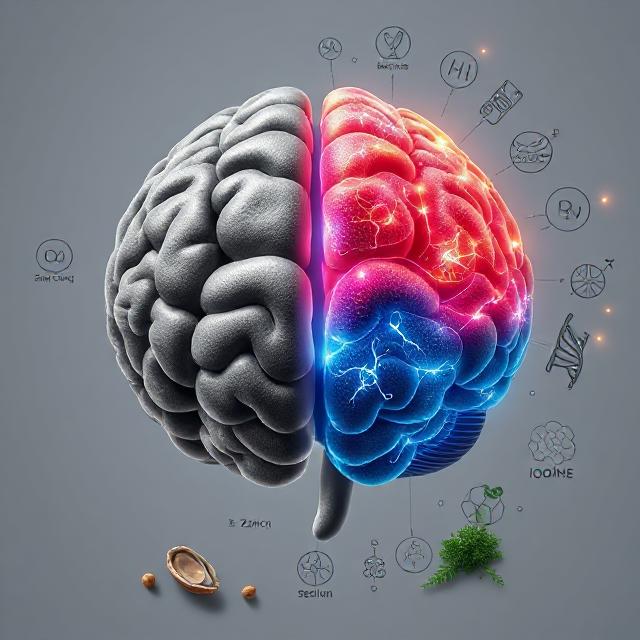
Table of Contents
Trace Minerals You’re Ignoring (and Need)
In a world obsessed with macronutrients, electrolytes, and major minerals like magnesium and calcium, a critical layer of nutrition is often ignored: trace minerals.
These micronutrients may be needed in tiny amounts—but their impact on your brain, metabolism, and energy is massive. Without them, even a “clean” diet can lead to chronic fatigue, foggy thinking, weakened immunity, and poor cellular repair.
This post dives into the trace minerals you’re ignoring (and need)—explaining their roles in cognitive function, mood regulation, and brain energy metabolism—and how to restore them strategically.
⚙️ What Are Trace Minerals?
Trace minerals are nutrients required by the body in very small amounts—typically less than 100 mg per day. Unlike major minerals like potassium or sodium, they’re measured in micrograms, yet they’re vital for:
- Enzyme activation
- Hormonal balance
- Neurotransmitter synthesis
- DNA repair
- Brain detox pathways
You don’t need much—but when they’re missing, key brain systems slow down or misfire.
🧠 Why Your Brain Depends on Trace Minerals
The human brain is a micronutrient powerhouse. Every cognitive task—from remembering a phone number to recovering from emotional stress—requires a cascade of enzymatic reactions fueled by trace minerals.
Lack of just one can result in:
- Low dopamine (focus, drive, reward)
- Poor synaptic communication
- Oxidative stress and brain aging
- Mitochondrial dysfunction
Many trace mineral deficiencies go undetected because blood tests often don’t reflect functional intracellular depletion, especially in high-stress or chronically inflamed individuals.
🔬 The Top Trace Minerals You’re Probably Ignoring
Here are the most commonly overlooked but vital trace minerals for mental clarity and long-term cognitive health:
1. Zinc
Why it matters:
Zinc regulates over 300 enzymes and is crucial for:
- Memory consolidation
- Immune regulation
- Neurotransmitter release
- Brain development
Deficiency signs:
- Brain fog
- Low libido
- Poor stress resilience
- Loss of taste or smell
- Slow wound healing
Sources: Oysters, pumpkin seeds, beef liver, lentils, tahini
Tip: Balance with copper—over-supplementing zinc can induce copper deficiency.
2. Copper
Why it matters:
Copper assists with:
- Iron metabolism
- Dopamine and norepinephrine production
- Myelin sheath integrity (brain signal insulation)
Deficiency signs:
- Fatigue
- Poor coordination
- Low mood
- Premature gray hair
Sources: Liver, dark chocolate, shiitake mushrooms, sesame seeds
Note: Copper is often low in high-zinc or carnivore-style diets.
3. Manganese
Why it matters:
Manganese helps:
- Support mitochondrial energy production
- Form superoxide dismutase (a key antioxidant in the brain)
- Regulate blood sugar and cognition
Deficiency signs:
- Mood instability
- Noise sensitivity
- Poor wound healing
- Dizziness
Sources: Pineapple, oats, pecans, brown rice, leafy greens
Avoid: Excess iron intake, which can suppress manganese.
4. Selenium
Why it matters:
Selenium protects the brain through its role in:
- Glutathione peroxidase (an antioxidant enzyme)
- Thyroid hormone metabolism
- Mood stability and reproductive function
Deficiency signs:
- Anxiety
- Thyroid dysfunction
- Fatigue
- Brain fog
Sources: Brazil nuts (1–2 per day is enough), sardines, eggs, sunflower seeds
Caution: High doses are toxic—microdose wisely.
5. Chromium
Why it matters:
Chromium enhances insulin sensitivity and glucose regulation—essential for:
- Stable energy
- Mental clarity
- Craving control
Deficiency signs:
- Energy crashes
- Irritability
- Sugar addiction
- Poor blood sugar control
Sources: Broccoli, barley, grape juice, turkey, green beans
Helpful for: Brain fog during low-carb transitions.
6. Iodine
Why it matters:
Iodine supports thyroid hormone production, which governs metabolism and brain speed.
Deficiency signs:
- Low energy
- Cold intolerance
- Sluggish thinking
- Puffy face
Sources: Seaweed, iodized salt, shellfish, eggs
Caution: Don’t megadose without thyroid labs.
7. Molybdenum
Why it matters:
This rare mineral helps detoxify sulfites and support mitochondrial enzymes.
Deficiency signs:
- Sensitivity to wine or dried fruits
- Brain fog after high-sulfur foods
- Histamine intolerance
Sources: Lentils, peas, oats, yogurt, beef liver
⛔ Why Most Diets Miss These Minerals
Even if you eat “healthy,” trace mineral depletion is still common due to:
- Soil depletion: Industrial farming strips micronutrients
- Water filtration: RO and distilled water remove minerals
- Low seafood intake: Modern diets lack sea vegetables and iodine sources
- Stress and sweat loss: Increase demand for zinc, chromium, and selenium
- One-sided supplementation: Taking calcium or zinc without balancing copper, magnesium, or boron
Trace minerals are synergistic—overloading one can suppress others. Smart balancing is key.
💊 Should You Supplement?
Only supplement trace minerals when you’ve:
- Assessed dietary intake
- Addressed gut health (to ensure absorption)
- Identified likely stressors or patterns of depletion
Best formats:
- Ionic mineral drops (for general replenishment)
- Whole-food mineral complexes (organically bound)
- Microdosed trace blends (1–2x per week)
Avoid high-dose, single-mineral supplements unless guided by testing.
✅ How to Rebuild Your Trace Mineral Base
Here’s a simple weekly protocol to start restoring trace minerals without overdoing it:
| Action | Frequency |
|---|---|
| Add 1–2 Brazil nuts to daily snack | Daily |
| Eat seaweed (e.g. nori or dulse flakes) | 2–3x/week |
| Use trace mineral drops in water | 3–5x/week |
| Rotate mineral-rich foods (seeds, liver, fish) | Weekly |
| Avoid heavy metals (aluminum foil, tap water) | Always |
| Limit high-phytate foods if low mineral status | Ongoing |
🧠 Final Thought: Small Inputs, Massive Impact
In peak performance culture, trace minerals are the quiet champions. While they may not offer the same instant boost as caffeine or stimulants, their long-term effect is profound.
Fixing trace mineral imbalances can restore mental clarity, stabilize energy, deepen sleep, and sharpen focus—especially if you’ve hit a plateau.
Don’t just optimize your macros.
Don’t just hydrate.
Rebuild your foundation.